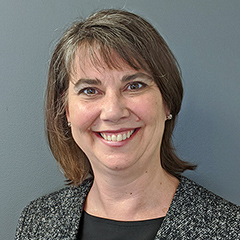Since the spring of 2020, Mathematica has been convening the Primary Care COVID Chat on Twitter, a gathering of primary care leaders* meeting several times a year for a social media-based conversation about primary care in the age of COVID-19. Organized by the four of us—Senior Fellow Diane Rittenhouse; Health Innovations Director Julie Schilz; Senior Clinical Program Lead Llew Brown; and Mathematica’s social media manager, Jill Feldman—the Primary Care COVID Chat has become a new way for us to share our research, connect with our peers, and carry forward Mathematica’s mission of using data and evidence to improve well-being.
When we began the project, the three of us from the Health team had very little idea of what a Twitter chat was. But we were committed to raising awareness about the role of primary care during the pandemic. All four of us had been reading a series of weekly primary care provider surveys published by the Larry A. Green Center and the Primary Care Collaborative (where Mathematica is an executive member), and each one chronicled what seemed to be an unfolding disaster. Survey results reported on personnel shortages, unfilled requests for protective equipment, physician burnout, and rising numbers of bankruptcy cases, with news going from bad to worse each week. When the idea of a Twitter chat was floated, it offered an opportunity to use Mathematica’s social media presence to build something useful in the middle of the crisis and a potentially powerful way to share resources and knowledge quickly. Why not use Twitter for that? It was a case of making lemonade out of lemons.
The first step for any Twitter chat is to consider community. Who will this chat engage? Who will it help? The next step is to build partnerships. Our Primary Care COVID Chat had a good idea of the community it would try to reach: primary care providers and practices grappling with COVID-19. But our team hit its stride when it came to step two. We wanted our chat to be diverse and represent the breadth of the primary care community. That would mean involving not only doctors and nurses but also researchers, advocates, payers, and leaders of professional organizations, to name just a few of the partners we had in mind. Reaching out far and wide, we tapped professional connections, colleagues, and more. A friend of Llew’s from college, who is now an associate dean at Penn State University and an officer with the National Black Nurses Association, joined the chat as a cohost. So did another friend who used to lead the Philippine Nurses Association of America. There are a lot of great thinkers in the primary care community. We were fortunate to connect with many who were willing to take a leap of faith with us and cohost the chat.
The appeal was that our chat would be solution-oriented and collaborative—an extension of what brought so many of us to the field of primary care in the first place. We also had a lot to talk about. The primary care community wasn’t only dealing with immediate fallout from the pandemic. We knew that when the pandemic was over, there would be a chance to fix things in health care that had been broken for a long time. As more and more cohosts signed on, we worked to create a chat schedule that would allow us to cover the issues we were passionate about (health care disparities and equity, rising pressures on providers and practices) while accommodating busy schedules and varying degrees of familiarity with Twitter. We created PowerPoint presentations, video chats, and open office hours to help those new to the platform get on board. Meanwhile, cohosts who were already experienced with Twitter chats traded emails discussing the six or seven questions needed to support each chat. In the background, team Mathematica was collecting links to articles, studies, papers and even the occasional GIF we planned to share. If you want to enjoy a Twitter chat, we learned, you have to prep. Most of the tweets we sent from our Mathematica accounts were written in advance. That freed us up to read other people’s tweets as they came in, and to comment on, like, and retweet as many as we could.
Our #PrimaryCareCovidChat was a little like a cocktail party, we said, or sometimes it felt like a potluck dinner. As hosts, we were there to make sure everyone felt welcome and included in the conversation. But we never knew who was going to show up and participate—many people prefer to watch Twitter chats from the sidelines—or what people might bring to the table. A chat like ours could serve up some weighty dishes. The Primary Care COVID Chat archive is full of research briefs and studies, scientific articles and links to academic journals, op-eds and commentary—complex topics dissected by a community of health care professionals. We wanted to be able to respond as thoughtfully as we could in the time and 280 characters we had.
By the time we launched the Primary Care COVID Chat on June 18, 2020, more than 15 cohosts were ready to run a conversation about the challenges facing primary care during the pandemic. Still more cohosts signed on for the second chat, on July 23, 2020, focused on the growing popularity of telehealth. Our third, on September 17, 2020, explored health care disparities exposed and exacerbated by the pandemic. We ended 2020 with 26 cohosts and a chat on November 19 about the importance of integrating behavioral health into primary care, a reflection of the widening scope of the pandemic’s toll. In 2021, we opened with a February 18 chat focused on vaccine rollout, then met again on May 13 to discuss the urgency of payment reform in a post-pandemic world.
Using Twitter to share knowledge and experience has felt like a right-sized opportunity to us. We’ve been able to take a subject that has informed our work for years and a crisis that was immediate and stay true to ourselves as an organization that deeply values collaborative partnerships. And our chat has even won an award! The Twitter chat might have been a new idea to some of us when we started, but since then it has checked a lot of boxes. We connected with organizations that joined us as cohosts, we met people whose work we’ve admired, and we built a knowledge base on Twitter that reflects what primary care leaders facing an unprecedented health care emergency have been reading, sharing, and eager to discuss. You can see it all by searching #PrimaryCareCovidChat. And you can learn about our upcoming chats by following Mathematica on Twitter. We hope to see you there!
*Organizations that have cohosted the #PrimaryCareCovidChat:
- AcademyHealth @AcademyHealth
- American Academy of Pediatrics @AmerAcadPeds
- American Association of Nurse Practitioners @AANP_News
- American Board of Family Medicine @TheABFM
- American College of Physicians @ACPinternists
- California Health Care Foundation @CHCFNews
- Center for Connected Health Policy @CCHPCA
- Center for Optimizing Rural Health at Texas A&M University @ARCHI_Texas
- Center for Consumer Engagement in Health Innovation @CCEHI
- Center for Professionalism and Value in Health Care @TheCPVHC
- Collaborative Family Healthcare Association @CFHA_tweet
- Commonwealth Fund @CommonwealthFND
- Larry A. Green Center @GreenCenterOrg
- Milbank Memorial Fund & Quarterly @MilbankFund
- National Association of Community Health Centers @NACHC
- National Black Nurses Association @NBNAInc
- National Center for Integrated Behavioral Health at the University of Pennsylvania @Penn_NCIBH
- National Patient Advocate Foundation @NPAF_tweets
- Philippine Nurses Association of America @MyPNAA
- Primary Care Collaborative @PCPCC
- Primary Care Development Corporation @PrimaryCareDev
- Robert Graham Center of the American Academy of Family Physicians @TheGrahamCenter
- Share Our Selves Community Health Center @ShareOurSelves
- Society of General Internal Medicine @SocietyGIM
- Society of Teachers of Family Medicine @STFM_FM
- This is Our Shot @ThisIsOurShot
- Well Being Trust @WellBeingTrust
- X4Health @X4_Health





